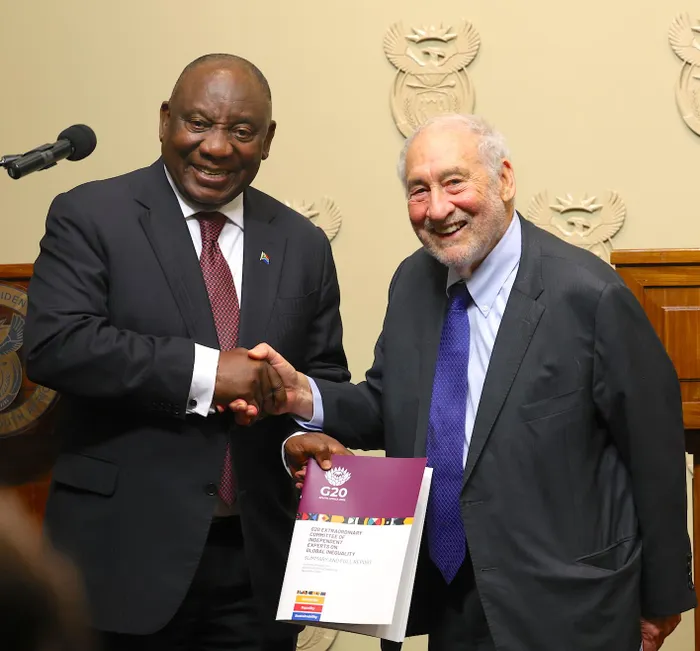South Africa's G20 Leadership: A Mixed Bag for the Global South

President Cyril Ramaphosa receives the G20 Task Team Report on Inequality from Professor Joseph Stiglitz during an official handover ceremony at Tuynhuys in Cape Town on November 4.
Image: GCIS
Ashraf Patel
South Africa’s G20 leadership concludes with the apex G20 Leadership Summit taking place on 22-23 November in Johannesburg.
It has been a roller coaster ride from the get-go with the Trump 2.0 trade shocks, bullying SA and Nigeria in Africa’s G20 year, with the US downgrading its G20 commitments. This period was also marked by the intensification of civil wars and electoral violence on the African continent.
Media narratives and coverage of G20 and reporting of G20 events have failed to connect their relevance to everyday struggles- from the high cost of living or need for AI regulation against social media harms, or climate finance and energy access.
Brazil's 2024 G20 agenda was bold and managed to secure solid commitments on ultra-rich tax commitment and a Global Compact on Hunger and inequality. The appointment of two noteworthy Expert groups on Finance, chaired by Trevor Manuel, and Inequality, chaired by Dr Joseph Stiglitz, in addition to the dozens of meetings held by ministers to craft communiques.
G20 Finance Track
Global finance reform is the genesis of the G20's DNA - and this is the great test for the forum. Despite numerous finance and central bank meetings, there are no concrete commitments on core issues such as IMF reforms and the actual write-off of the debts in the poorest African nations.
The Cost of Capital commission - a most promising initiative of this year’s G20 Presidency has sadly been downgraded. Here, South Africa and the African Union (AU) could have been bolder in pushing for a global UN Tax treaty and Debt write-offs, where resources could be mobilised for meeting the UN SDG goals.
Given the current geopolitical contestations and US disengagement from UN platforms, commitment to climate finance at the UN Seville Finance for Development conference will be difficult to implement. Overall, the G20 Finance track has been muddled in diplomatic rhetoric, and yet another Expert Group on Finance, chaired by Manuel, has not made any concrete recommendations. Old wine in new bottles is what South Africa gives to the world.
Inequality Reports
This week, the G20 under President Ramaphosa released the G20 Inequality Report, co-chaired by Dr Joseph Stiglitz. The report has done very good work with actionable plans, building on the UN Panel on Inequality, and already reaffirming the deepening inequalities within and between regions in the global economy in the post-COVID world. The report is comprehensive, recommending an International Panel on Inequality IPI ), which is laudable.
The key challenge is what core agreements on reducing inequality will be agreed upon. But with ‘all things G20’, the sobering reality is that nations are not obliged to implement any G20 recommendations.
WHO Pandemic Fund and the Pandemic Treaty
Notable progress in global public health was the South African National Department of Health (NDoH), in collaboration with the World Health Organization (WHO), the United Nations Children’s Fund (UNICEF), and the Food and Agriculture Organization (FAO), launching the Pandemic Fund Project under the One Health approach.
The Fund is the first multilateral financing mechanism dedicated to helping low- and middle-income countries bolster their capacity to contain disease outbreaks and prevent pandemics, and the modest funding that SA secured is a good start to scaling resources for pandemic preparedness in 2025, with the BRICS Pandemic platform already scaling in terms of technology transfer, etc.
A docile civil society
Finally, the people.
South Africa was once the most vibrant civil society and social justice movement. From the UN Aids Summit and the World Conference on Sustainable Development WSSD in the 2000s, we had a vibrant, robust, and independent civil society that was an inspiration for the Global South.
While at previous G20 summits in the Northern capitals where social justice activists from Canada to Germany were a prominent voice and force in pushing for a radical agenda, South Africa’s Civil and Social 20, Labour 20 et al, were at most reduced to a talk shop in comfortable urban settings. This civil society demobilisation is a scar on South Africans, where a once vibrant and robust civil society movement has been reduced to a shadow of its former self.
Perhaps decades of donor dependency may have had an impact? South African civil society needs to go back to the drawing board and undergo the critical reflection required. There was a time when we led; today we are led.
Despite laudable efforts by South Africa and the AU to push for a progressive development agenda, it has been muddled in ‘talks about talks' with the need ‘ to find consensus, the default position on all things G20.
As the US under Trump takes over the G20 in 2026, and downgrades most of our G20 development agenda, South Africans and Africans, would have to ask sobering questions if hosting it was really worth it.
* Ashraf Patel is a Senior Research Associate at the Institute for Global Dialogue, UNISA.
** The views expressed do not necessarily reflect the views of IOL, Independent Media or The African.